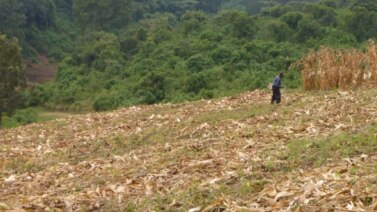Most West Coast ports in the United States have been busy since Friday. That is when negotiators reached a tentative settlement in a nine-month labor dispute and work slowdown. Now that goods again are being unloaded the dockworkers and employers say they can talk about long-term problems.
Many ships have been docked or have been waiting offshore at 29 West Coast ports. Port officials say it will take months to process all the cargo. Most dockworkers have returned to work. But they still must vote on a tentative five-year contract.
U.S. Secretary of Labor Thomas Perez went to San Francisco to urge both sides to settle their differences quickly. Craig Merrilees is with the International Longshore and Warehouse Union. He said the negotiations have been difficult.
“You know, there are a lot of tough issues in this process that lasted over nine months, and some of them are the kinds of issues that are affecting all workers. That includes the outsourcing of good jobs.”
Workers say administrative jobs at the port have been moving to other states and other countries. Workers say they also worry about increasing automation of port operations, reducing the need for workers.
Those who move goods in and out of the country include the San Francisco coffee company, Ritual Coffee Roasters. Eileen Rinaldi is the owner.
“We are reliant on constant arrivals of coffee in order to have a fresh supply.”
Many other businesses depend on goods passing through the ports, such as beer makers that use imported hops, farmers with crops to ship. One California children's clothing company has been waiting for its products trapped in ships near the Port of Oakland.
Tom O’Brien is a transportation expert at California State University, Long Beach. He says long-term problems at the ports must be addressed. Mr. O’Brien also says not only the port but roads, bridges and railways need to be upgraded.
“The fact that we have larger ships coming now, that is creating peak demand for labor and for equipment is putting a lot of pressure on our infrastructure, not only the ports, but the road network, rail capacity, distribution center and warehousing.”
The labor dispute began in July when a labor agreement ended. The work stoppage has affected 29 West Coast ports for months and slowed U.S. trade with Asia. Those ports process more than 25 percent of all U.S. maritime trade and more than 70 percent of the nation's imports from Asia.
I'm Mario Ritter.
Mike O’Sullivan reported this story from Los Angeles. Mario Ritter wrote it for Learning English. Caty Weaver was the editor.
Words in This Story
tentative – adj. not definite: still able to be changed
cargo – n. something that is carried from one place to another by boat, airplane, etc.
address – v. to give attention to (something): to deal with (a matter, issue, problem, etc.)





